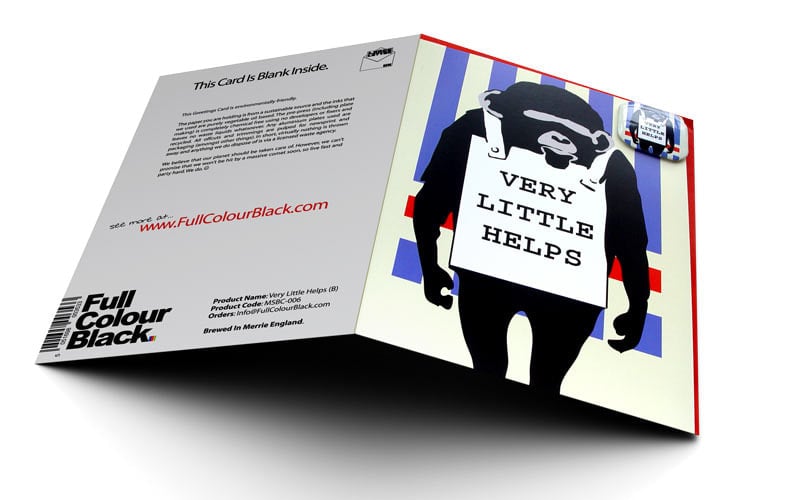
It doesn’t appear to be a cheeky prank or a practical joke this time. The “Cancellation Division” of the European Union Intellectual Property Office (EUIPO) just issued a decision declaring a trademark owned by street artist Banksy invalid.
Further, an attorney says the mysterious street artist and his attorneys are themselves to blame. The “real nail in the coffin,” attorney Aaron Wood told the World Trademark Review in announcing the news on May 19, was the “public comments of Banksy and his lawyer.”
Wood represents a greeting card company known as Full Colour Black Limited, a specialty retailer of street art greeting cards, that went head to head with Banksy over its use of Banksy’s Laugh Now. One of the artist’s most famous images, the work shows a monkey wearing a sandwich board. Some versions of the image bear the inscription “laugh now but one day we’ll be in charge.”
Banksy, (2002). Courtesy of Christie’s Images, Ltd.
The company officially charged with issuing certificates of authenticity for Banksy, known as Pest Control, first filed an EU trademark claim for the monkey sign artwork in late 2018. A year later, in November 2019, Full Colour Black fought back, and applied for cancellation of the trademark, arguing that it was filed in bad faith and that it was non-distinctive.
It was here that Banksy’s own MO came back to haunt him.
Full Colour Black claimed that the art is a work of graffiti sprayed in a public place—and EUIPO agreed. “It was free to be photographed by the general public and has been disseminated widely,” the ruling states. “Banksy permitted parties to disseminate his work and even provided high-resolution versions of his work on his website and invited the public to download them and produce their own items.”
Selection of Laugh Now-themed cards from the “Monkey Signs” section of the Full Colour Black website.
Furthermore, in his 2007 book Wall and Piece, Banksy had said that “copyright is for losers.” The ruling notes that the street artist explicitly stated that the public is morally and legally free to reproduce, amend, and otherwise use any copyright works forced upon them by third parties.
The artist has known for years that his works are widely photographed and reproduced by a range of third parties without there being any commercial connection between these parties and Banksy, the EU office found.
Another factor that played into the ruling was the fact that Banksy’s true identity remains a mystery. “It is also noted that as Banksy has chosen to be anonymous and cannot be identified this would hinder him from being able to protect this piece of art under copyright laws without identifying himself, while identifying himself would take away from the secretive persona which propels his fame and success,” the ruling states.
Banksy, as seen in a press image from Exit Through the Gift Shop.
The ruling noted the connection between Banksy and Pest Control, but said “the evidence is not exhaustive in this regard as the identity of Banksy cannot be legally determined.”
Banksy might be in for more bad news in the weeks and months ahead. Similar trademark applications—including for another famous image, Flower Bomber—are pending. Wood said in total, there are five more cases before the EUIPO and he anticipates four of them being decided within the next month or so in the same way as this latest decision.
And the issues are not limited to the artist’s EU trademarks. Many of the applications filed by Pest Control Office around the world are based on registered rights within the European Union, so the EUIPO finding will have knock-on effects.
“I believe the decision sounds the death knell for his trademark portfolio—at least in the European Union—and it raises the spectre of cases in other countries,” Wood told the World Trademark Review. “In the United States, for example, you have to make a declaration of your intent to use a mark and the effect of fraud is substantially more important. I dare say a finding that Banksy is a fraudster will not go down well.”